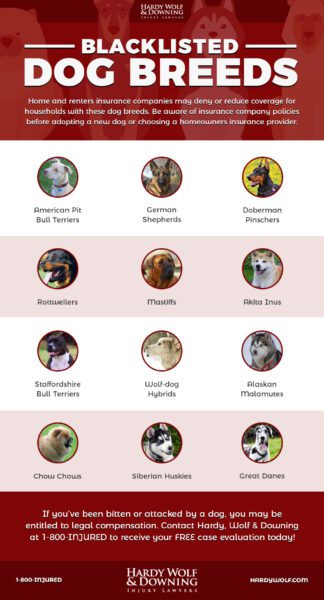
For many homeowners, a house isn’t a home without a dog. Although you may be ready to find Fido at your nearest breeder or shelter, you should always remain aware of breeds that may cause financial headaches down the line. The dog you choose may be the sweetest animal in the world, but some insurance companies will hold your pet’s breed against them, potentially refusing to provide home or renter’s insurance coverage for households with dogs of a particular breed. Familiarize yourself with the most commonly blacklisted breeds before committing to a dog to make sure your insurance coverage remains intact.
Top Three Dog Breeds Banned by Insurance Companies
Pit Bull Terriers
Roughly every decade or so, there’s a new dog breed that is considered more dangerous than the others for various reasons. Within the past ten years, the American pit bull terrier has been touted as one of the most aggressive and irrational breeds due to numerous national news stories about pit bull bites. This has almost invariably earned the breed a spot on insurance company blacklists across the country.
Pit bulls originated in the United Kingdom as a result of breeding Old English Terriers and Old English Bulldogs, hence the name bull terrier. These dogs were used in blood sports like bear baiting, but were later used in dogfights when blood sports were outlawed. Once they were brought to the Americas, however, bull terriers were adapted for multiple uses. While some retained their fighting dog purposes (illegally), others were bred for hunting, herding, police work, therapy, and even companionship.
The breed is typically characterized as eager to please, intelligent, confident and strong. However, because of their strength, they may prove destructive as well. This assumption should be taken with a grain of salt, as the situations behind bites vary and the history of the breed is heavily skewed toward aggressiveness, which may simply suggest a need for adequate human training.
Great Danes
Known as “Gentle Giants”, it may come as a surprise that Great Danes are often on insurance companies’ blacklists. Great Danes are one of the largest breeds of dog, on average standing almost three feet to the shoulder. Though the exact origin of the Great Dane is unknown, the predecessor to the modern-day Dane is believed to be a cross between the English Mastiff and Irish Wolfhound, used to hunt large game such as boar and bear.
Although they have large figures, Great Danes are said to possess a particularly friendly and affectionate nature. They tend to lack aggressiveness and predatory drive. Even though they have positive personality traits, training, and socialization are still vital for a Great Dane early in life. With such a large body, a fearful or antisocial dog could potentially cause serious harm. With proper training, however, a Dane could become an excellent family dog.
German Shepherds
This popular breed was surprisingly considered one of the most aggressive dog breeds just a few decades ago. German Shepherds are elegant dogs with a strong following among American households. As their name suggests, German Shepherds are working dogs that require training and a constant activity with which to occupy their time to remain healthy and happy. This often makes them ideal candidates for police work, disability assistance, search-and-rescue, military, and even entertainment performances.
German Shepherds are relatively large dogs with a powerful bite, making an untrained and unrestrained German Shepherd potentially hazardous and destructive. However, a well-trained German Shepherd is known to be fiercely loyal and safe, making them excellent guard dogs and family protectors.
Personal Injury Lawyers in Portland and Lewiston, ME
As with most dog breeds, training is often the key to safety around canines. By remaining proactive and dedicated to developing a strong bond between you and your dog, you can enjoy a wonderful relationship with your family pet.
Unfortunately, not every pet owner will be responsible. If you encounter a situation in which you are attacked or bitten by someone’s untrained dog, you may be entitled to legal compensation. Contact Hardy, Wolf & Downing Injury Lawyers to receive your free case evaluation today! Inquire online or give us a call at 1-800-INJURED.

